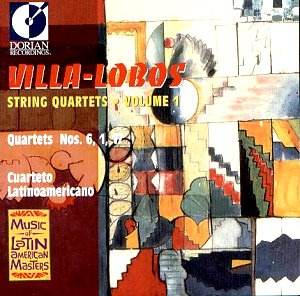The cycle of Villa-Lobos’s Quartets, of which
this is the first in a six volume series, is one of the most vibrant
and rhythmically agile of the twentieth century. He was a relentlessly
inventive composer in the quartet medium spicing his harmonies,
introducing folk melodies, dance rhythms, galvanizing his scherzi
(in particular) with eruptive and detonatory pizzicato passages,
embedding – early on – impressionistic devices into his scores
and generally springing gorgeous but not treacly melody and lyricism
throughout. He has the great gift of keeping auditory sensations
constantly engaged by the richness of his melodic breadth and
colour. The Latin American Quartet (Cuarteto Latinamericano) offer
a mixed recital, early, middle and late quartets mixed up, and
differ from their rivals, the Danubius Quartet on Marco Polo,
who opt for a chronological survey. The three periods so often
referred to in relation to his compositional life are here accommodated
with effortless ease in the first volume of this promisingly edited,
excellently recorded and convincingly played traversal.
The First Quartet of 1915 is suite-like and in
six movements. It’s written in his early intensely expressive
and compressed style with a jaunty second movement called Brincadeira
(A Joke) full of pizzicati and humour. The central slow movement
is harmonically pliant and yearning and after a curiously withdrawn
Melancholia fifth movement there’s a banishing-all-care finale
spiced with his saucy rhythmic drive. Over twenty years separates
the First from the Sixth, by which time we are entering Villa-Lobos’s
second creative phase but once again those essential elements
that make his quartets so distinctive are present here. There
is playfulness but a technical security that certainly bears out
his stated admiration for Haydn. The balance he secures between
single voices and unison phrasing is excellently convincing as
is the easy way he embeds the native Sertão rhythms and
plays with the irregularity of rhythm as well. There’s a particularly
expressive moment for the viola in the slow movement and in the
finale he hearkens back to the opening Poco animato, in a satisfying
way but not one especially seeking cyclical procedures. There’s
more angularity here and a degree of compositional density and
shifting metres – playful, yes, but restless – that suddenly darkens
in the viola line in reminiscence of the slow movement, accompanied
by strong and heavy accents. This is a quartet that the Hollywood
Quartet recorded and it deserves repeated listening.
The 17th – he began but didn’t live
to complete No. 18 – comes from 1957. It has a newly classical
feeling for all the sometimes abrasive material, opening as it
does with triplets and flirting with some brittle, discursive
material. The Lento has a refined rather chaste beauty before
breaking into a fast section, and some more openly straightforward
lyricism. He even threatens some fugato classicism but resists.
After a sliver of a Scherzo we have a brisk, propulsive engaging
finale with an attractive contrasting slower section. It was premiered
by the Budapest Quartet one month before Villa-Lobos’ death.
A fine start overall then, to a much neglected
body of work. Documentation and recording are both excellent.
There are five more volumes to come and I’ll be reviewing them
all with the greatest interest.
Jonathan Woolf
Other
reviews
Volume
1
Volume
2
Volume
3
Volume
4
Volume
5
Volume
6
